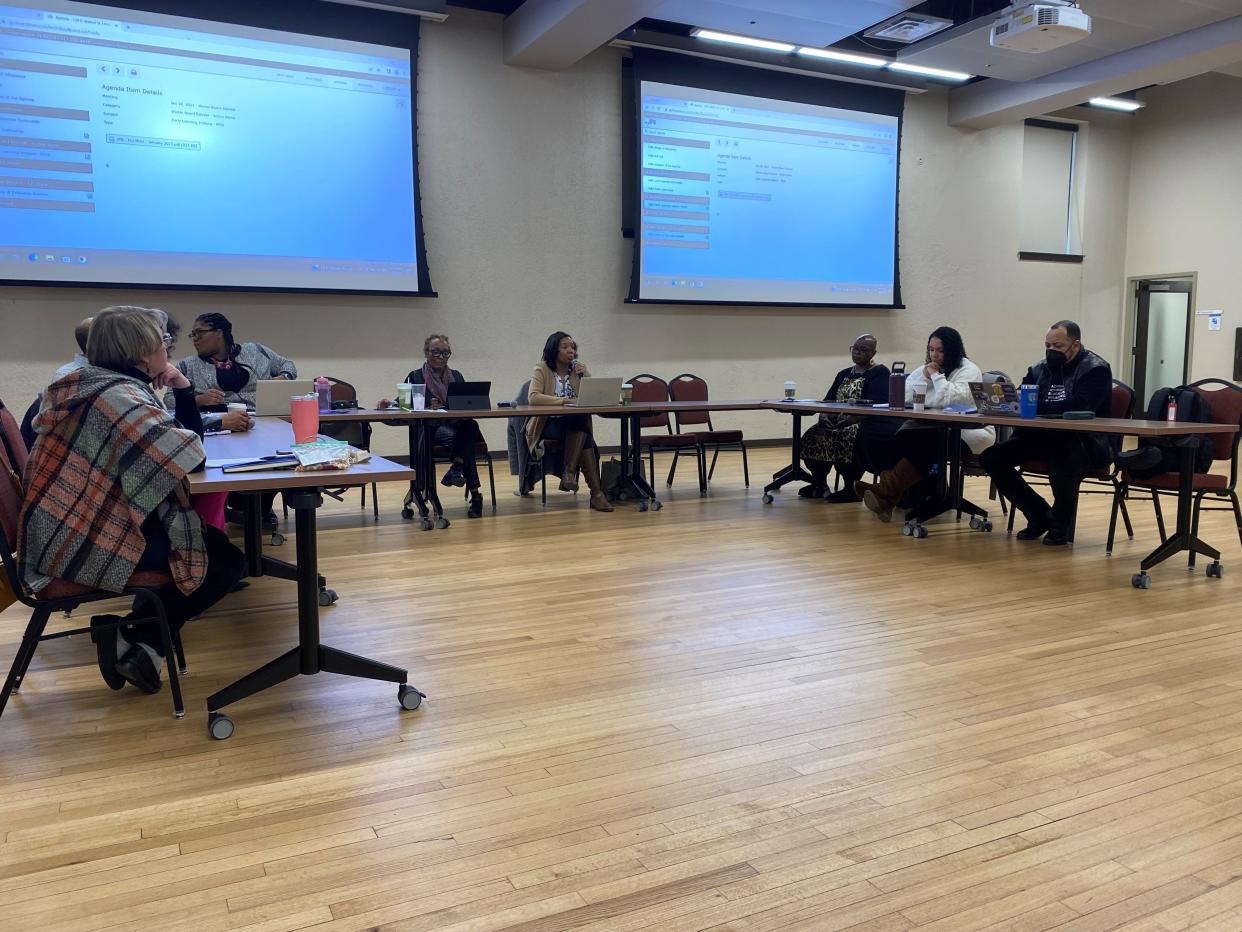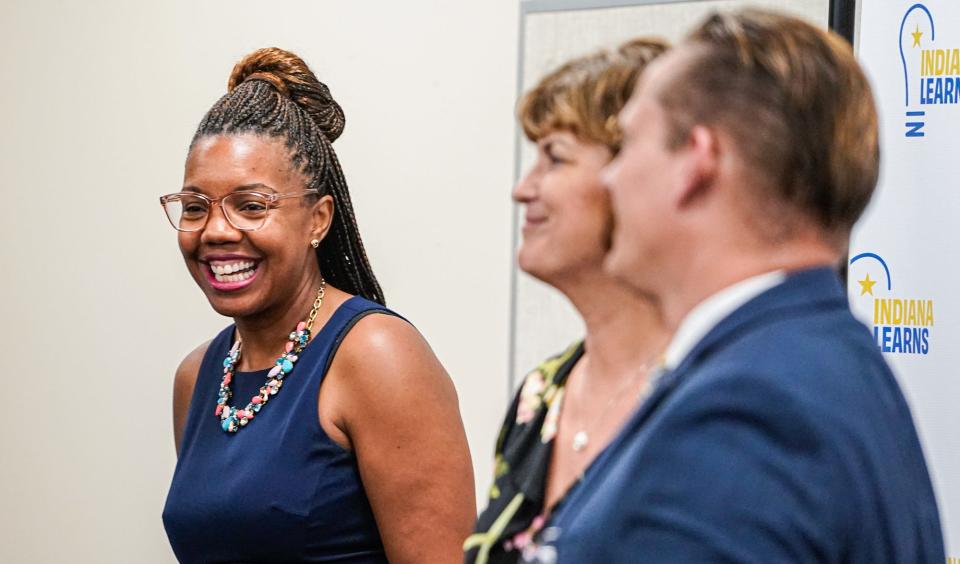Why IPS delayed operating referendum and what it means for future

The Indianapolis Public Schools board Saturday delayed voting on its $413 million operating referendum, making it extremely unlikely that Center Township voters will see the question on their May ballot.
The IPS board was scheduled to vote on the operating referendum resolution Saturday morning at their winter board retreat meeting but in a last-minute change the referendum was taken off the agenda.
The decision came the day after the Indy Chamber issued a statement urging IPS to postpone passing the operating referendum after expressing various concerns and questions they would like to see addressed first.
IPS board president Venita Moore told reporters after Saturday’s meeting that the board may have had the majority of votes needed to pass the referendum but not unanimously, which is what she would like to see.
“Why would you want to be unanimous or so close to unanimous, because if you go to the public asking for $400 million, they have to believe that the people behind it believe so,” Moore said.
Still dozens of families, mostly supporting charter schools, showed up Saturday morning to voice their demand that referendum dollars be shared equally among all public schools in the district, including non-innovation charter schools.
Why was the operating referendum vote delayed?
Each IPS board commissioner did not explain on Saturday what their position is on approving the operating referendum but Moore explained that since innovation charter school leaders were still not supportive, that concerned some board members.
Moore said that the board had come to innovation schools with a new proposal for sharing referendum dollars, one that would give each student the same base amount, which is a change from what the IPS administration presented last week.
IPS and charter schools:IPS proposes sending more referendum dollars to innovation charter schools
Moore also explained that K-8 schools would have received more dollars since that is where most of the changes will happen under the Rebuilding Stronger Plan. Student complexity also played into deciding where additional dollars should go.
But Moore said even after that updated proposal, the innovation school leaders were not in support of the referendum plan.
The board still has until February 17 to pass the referendum plan for it to appear on the May ballot. But as concerns with charter school leaders and other influential business groups still need to be addressed, it is now looking like the earliest it would appear before voters would be on the November ballot.
What does this mean for the Rebuilding Stronger Plan?
It’s now unclear exactly what parts of the Rebuilding Stronger plan are possible, given that voting on the operating referendum has been delayed.
The funding from the operating referendum was going to mostly underwrite teacher and staff compensation but the money would also go towards school programming and curriculum.
More on IPS referendum: Indy Chamber comes out against proposed IPS referendum one day ahead of vote
A part of the Rebuilding Stronger plan included closing down multiple schools at the end of this school year but after no vote was taken Saturday Moore said she did not know what aspects of the plan will need to be adjusted.
What will happen to the capital referendum?
The district’s proposed $410 million capital referendum will be on the May ballot. This measure aims to fund construction projects throughout the district, including rebuilding an elementary school and creating new stand-alone middle schools.
The capital referendum would increase the property tax levy to no more than $0.2066 per $100 of assessed value.
IPS Superintendent Aleesia Johnson said Saturday that district officials plan to share soon what the delayed vote for the operating referendum means for the future.
“What that funding will mean for students and their learning environments is a very big deal, and I don’t want that to be lost in the disappointment of today,” Johnson said.
What are IPS officials saying?
During her lengthy comments at Saturday’s meeting, Johnson spoke about the current tense situation in which the district finds itself after charter school advocates have said IPS has perpetuated an unequal school system with the referendum proposal. IPS critics do not take into account the full picture, Johnson said.
Johnsons said she believes in the “it takes a village” approach as a better way to provide the best educational experience for all students, but that is not the current environment of Indianapolis’ public school system.
“But the reality is that we have created an educational system and landscape in this city that goes against the idea of the village,” Johnson said. “It is every person for themselves. It is ‘how do I make sure my school gets the resources?’ It is ‘I only need to be accountable to the people I directly serve.’ It is ‘there’s five schools already in a neighborhood? Well, there’s also an empty building and I’ve been authorized to open a school so I’m going to go there’ — further stretching already scarce resources.”

Johnson also voiced concerns about organizations in the district that do not support the referendum. She contrasted IPS's efforts to improve its finances with those of other neighboring districts that have successfully persuaded voters to support referenda.
“I have to believe that we all want for other people’s children what we want for our own,” Johnson said. “And I’m left to wonder why, time and time again, IPS is asked to wait on behalf of its students, to be more creative with its already strained resources, to figure out another way, when districts all across the Greater Indianapolis area make strides and have leveraged community investment multiple times to improve their buildings and experiences of their students — often without a comment or question from those outside of their district and school communities.”
Johnson said now is the time for all types of public schools in Indianapolis to have difficult conversations on what sacrifices are needed to support the success of all students.
Commissioner Diane Arnold said she was disappointed that the innovation partners were still not satisfied with the updated proposal of distribution of funds. She believes the distribution is equitable but did acknowledge that there are disparities in school funding in Indiana.
“However, we did not create that disparity,” Arnold said. “If our state legislature can find money to expand vouchers for private schools, perhaps they could also better support public charters as well.”
What are charter school supporters saying?
Leaders from influential education groups in the city like the Mind Trust, Stand for Children Indiana and RISE Indy all applauded the board on Saturday for delaying the vote on the referendum.
“This move today by IPS leaders will allow the tough but critical community conversations to happen to get this plan right,” Justin Ohlemiller, Stand for Children Indiana executive director said in a statement. “Stand for Children and our network of parents are committed to supporting IPS and its leaders as the hard work continues to create a plan that funds our public schools equitably and prioritizes closing opportunity gaps.”
Contact IndyStar reporter Caroline Beck at 317-618-5807 or CBeck@gannett.com. Follow her on Twitter: @CarolineB_Indy.
Caroline is also a Report for America corps member with the GroundTruth Project, an independent, nonpartisan, nonprofit news organization dedicated to supporting the next generation of journalists in the U.S. and around the world.
Report for America, funded by both private and public donors, covers up to 50% of a reporter's salary. It’s up to IndyStar to find the other half, through local community donors, benefactors, grants or other fundraising activities.
If you would like to make a personal, tax-deductible contribution to her position, you can make a one-time donation online or a recurring monthly donation via IndyStar.com/RFA.
You can also donate by check, payable to “The GroundTruth Project.” Send it to Report for America IndyStar Campaign, c/o The GroundTruth Project, Lockbox Services, 9450 SW Gemini Dr, PMB 46837, Beaverton, Oregon, 97008-7105. Please put IndyStar/Report for America in the check memo line.
This article originally appeared on Indianapolis Star: IPS delays referendum vote: What you need to know

